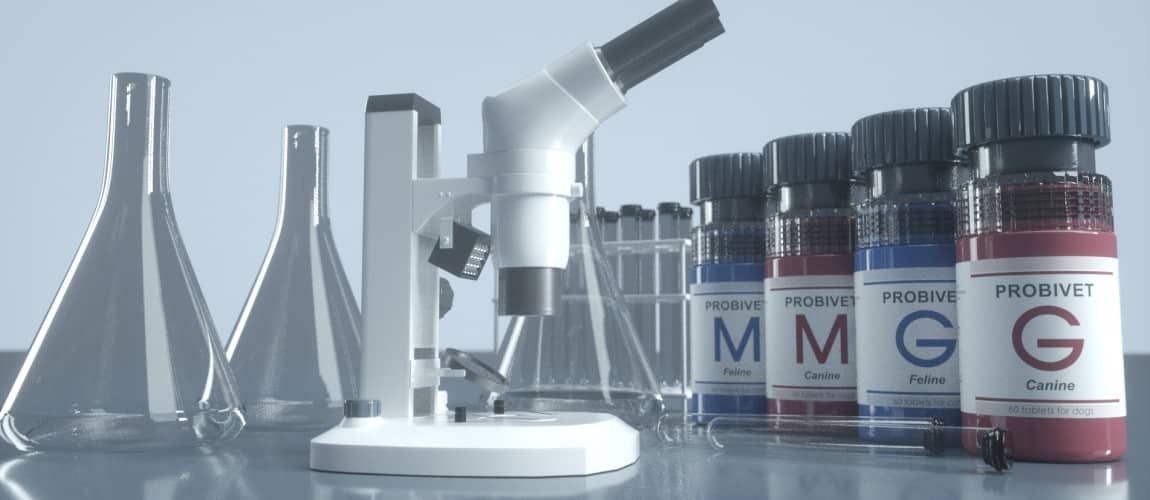

Just like in humans, the majority of cat’s and dog’s immunity resides in their digestive tract. It is important to maintain balanced amount of good bacteria, because this is one of the key factors to keep pet healthy. One of the ways to maintain such balance is to supplement with probiotics for dogs and cats. Probiotics are friendly bacteria that help to regulate not only digestive tract, but overall health of dogs and cats. Nowadays the usage of probiotics in vet practices is sharply growing. More and more vet doctors applying probiotics to their vet routine and prescribing them for dogs and cats.
Probiotics are live microorganisms and require high quality processing standard. Vet Division of Supreme Pharmatech is maintaining the highest standards in processing of probiotics supplements of best quality and long shelf life. Only strains with clinically confirmed efficacy are used.
Probiotics of Probivet-G type can effectively combat gastrointestinal tract infections, urinary tract infections (UTI), infections of respiratory and genital systems, food allergies and diarrhea.
Probiotics of Probivet-M type can effectively combat metabolic diseases, control level of blood glucose and lipids, diabetes and obesity, fatty liver disease and gout.
Both, Probivet-G and Probivet-M, are synbiotics type of supplements, because they contain not only friendly bacteria but also prebiotics. Reports shows that synbiotics are working more efficiently than probiotics only.
1. Administration of Bifidobacterium breve improves the brain function of a 1-42-treated mice via the modulation of the gut microbiome. Nutrients 2021, 13, 1602.
https://doi.org/10.3390/nu13051602
2. Application of bifidobacterium adolescentis CCFM1062 in preparation of functional microbial inoculum, food and/or medicament, CN110368406B
3. Bifidobacterium bifidum for relieving constipation and its fermented food and probiotic preparation. CN112940980A, Jiangsu Academic Papers Database
4. Bifidobacterium breve CCFM1025 attenuates major depression disorder via regulating gut microbiome and tryptophan metabolism: A randomized clinical trial. Brain, behavior and immunity, Vol. 100, Feb 2022, p. 233-241
5. Bifidobacterium longum capable of relieving atopic dermatitis and application thereof. CN109652349B
6. Effects of Zn-enriched Bifidobacterium longum on the growth and reproduction of rats. Nutrients 2022, 14, 783.
https://doi.org/10.3390/nu14040783
7. Efficacy and safety of the probiotic Saccharomyces boulardii for the prevention and therapy of gastrointestinal disorders. Therap Adv Gastroenterol. 2012 Mar; 5(2): 111–125. DOI: 10.1177/1756283X11428502
8. Integrative metabolomic characterization reveals the mediating effect of Bifidobacterium breve on amino acid metabolism in a mouse model of Alzheimer’s disease. Nutrients 2022, 14, 735.
https://doi.org/10.3390/nu14040735
9. Lactobacillus reuteri CCFM1072 and CCFM1040 with the role of Treg cells regulation alleviate airway inflammation through modulating gut microbiota in allergic asthma mice. Journal of Functional Foods,
https://doi.org/10.1016/j.jff.2020.104286
10. Lactobacillus rhamnosus and application thereof in inhibiting helicobacter pylori. CN111607538B
11. Lactobacillus rhamnosus capable of relieving alcoholic chronic liver injury and application thereof. Publication Number WO/2013/127148 dd. 06.09.2013, International Application No. PCT/CN2012/078861
12. Lactobacillus rhamnosus CCFM1107 treatment ameliorates alcohol-induced liver injury in a mouse model of chronic alcohol feeding. PMID: 26626356, DOI: 10.1007/s12275-015-5239-5
13. Lactobacillus rhamnosus CCFM1130 and application thereof in relieving and treating gout, CN112481172A
14. Lactobacillus rhamnosus FJSYC4-1 and Lactobacillus reuteri FGSZY33L6 alleviate metabolic syndrome via gut microbiota regulation. PMID: 33977963 DOI: 10.1039/d0fo02879g
15. Lactobacillus rhamnosus reduces blood glucose level through downregulation of gluconeogenesis gene expression in streptozotocin-induced diabetic rats. International Journal of Food Science Vol. 2020, Article ID 6108575
16. One plant of Lactobacillus reuteri that can be relieved allergic asthma and its application. CN109628359A
17. Oral administration of Lactobacillus rhamnosus CCFM0528 improvesglucose tolerance and cytokine secretion in high-fat-fed, streptozotocin-induced type 2 diabetic mice. Journal of Functional Foods Vol. 10, Sept. 2014, p. 318-326
18. Physiological characteristics, safety evaluation and genetic analysis of Bifidobacterium longum CCFM760. DOI: 10.3969/j.issn. 1673-1689.2020.02.011
19. Probiotic strains alleviated OVA-induced food allergy in mice by regulating the gut microbiota and improving the level of indoleacrylic acid in fecal samples. Pub date: 2022-03-10, DOI: 10.1039/d1fo03520g
20. Screening and probiotic characteristics analysis of Bifidobacteria with relieving constipation. 2019-05-15, GTID: 2370330548976014